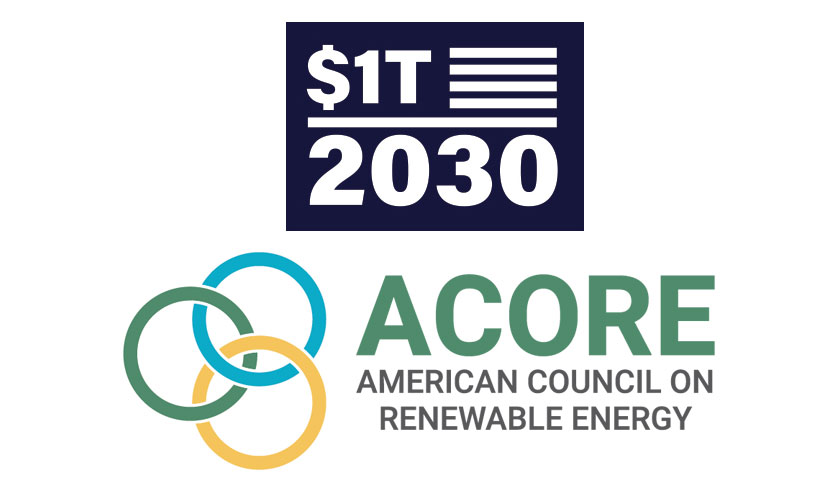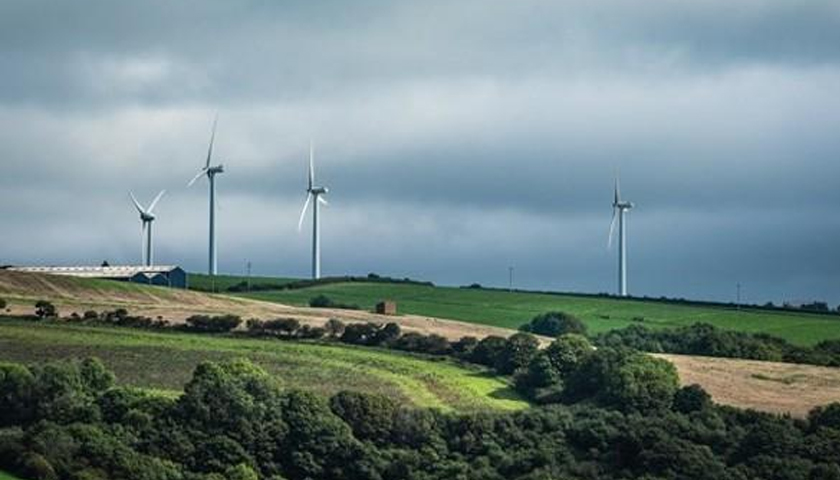The American Council on Renewable Energy (ACORE), a national business group made up of companies that finance, develop, manufacture and use all forms of renewable energy, announced the launch of a new campaign that aims to reach $1 trillion in new U.S. private sector investment in renewable energy and enabling grid technologies by 2030.
Through $1T 2030: The American Renewable Investment Goal, the country’s major providers of capital for energy infrastructure projects have now come together in a coordinated effort to accelerate the investment and deployment of renewable power as the sector moves to the next stage of market maturity.
The new campaign is managed through the Partnership for Renewable Energy Finance (PREF), a senior-level ACORE member program widely regarded as the nation’s most credible educational resource on renewable energy finance. To reach the ambitious but achievable goal of $1 trillion in domestic renewables investment by 2030, ACORE released a combined set of common sense policy reforms and distinct market drivers that are most essential for growth. As part of the $1T 2030 campaign, ACORE will be engaging with key business and government leaders, releasing new reports, hosting events and taking other steps in support of this important objective.
During opening remarks at the 15th annual Renewable Energy Finance Forum-Wall Street, ACORE President and CEO Gregory Wetstone commented:
“Renewable energy has come a long way and is economically competitive, but if we accept business-as-usual projections that predict a decline in annual investment and deployment levels in just a few years due to an uneven policy playing field, we will cede U.S. leadership and the immense range of economic benefits that come from being a dominant player in this booming global industry. With the $1T 2030 campaign, the investment community is charting a course to modernize America’s energy infrastructure that will create massive economic opportunities over the next decade and beyond.”
The $1 trillion in investment from 2018 to 2030 projected by ACORE is anticipated to be roughly split between direct private investment in renewable energy and investment in grid technologies, such as energy storage, that help improve integration of renewables and ensure a modern, reliable and resilient grid system now and in the future. In the absence of new policies, most analysts expect the recent flourishing pace of U.S. renewable investment to decline in the early 2020s, when renewable tax credits phase out, even as competing fossil fuel electricity sources retain permanent tax incentives.
If the campaign reaches its goal, America will close the innovation and investment gap with other nations, build on the impressive track record of job creation in wind, solar and related fields, and stay within striking distance of the U.S. commitment for greenhouse gas emission reductions outlined in the Paris Accord.
For more information regarding $1T 2030 initiative, please visit www.acore.org/1T2030.
The Future of U.S. Renewable Energy Investment: A Survey of Leading Financial Institutions
$1T 2030 is founded on a range of insights drawn from a new survey report of top investors gauging confidence in the U.S. renewable sector and the impacts of supportive policy reforms and market drivers.
ACORE’s survey took place in April 2018 and collected data and insights from senior-level respondents across the nation’s leading banking institutions, asset managers, private equity firms and other financial firms.
Survey respondents reported that with sustained demand, U.S. renewable energy will continue to be an attractive asset class with strong potential for investment growth. Market developments and policy changes over the coming decade will drive new demand for renewable energy, but investors are cautious about potential mixed policy signals which could slow demand.
Highlighted findings from the survey include:
- Over the next three years, investor confidence in the U.S. renewable energy sector is expected to remain high, with an average confidence level of 84/100.
- Two-thirds of respondents said they plan to increase their investments in U.S. renewables by more than five percent in 2018 compared with 2017, and half plan to increase their investments by more than 10 percent.
- 89 percent of respondents who chose to project their companies’ investments in U.S. renewable energy between 2018 and 2030 said they would double their planned investments in U.S. renewables under a supportive policy and market scenario compared with a business-as-usual base case.
- More than half (58 percent) of respondents said the lack of a federal policy driver for renewable energy after the sunsets of the production tax credit (PTC) and investment tax credit (ITC) is a hurdle for continued growth at current levels.
- Expanded state renewable portfolio standards were identified as key growth policies, with 45 percent of respondents indicating they are “very important” and 50 percent indicating they are “important.”
- 88 percent of the respondents identified energy storage to be a leading magnet for investment within the next three years. This investment should, in turn, stimulate renewable energy development, with three-quarters of respondents reporting energy storage scale-up to be an important market driver for renewables growth to 2030.
The full survey report is available at www.acore.org/investmentsurvey.
Link
http://www.reffwallstreet.com/



